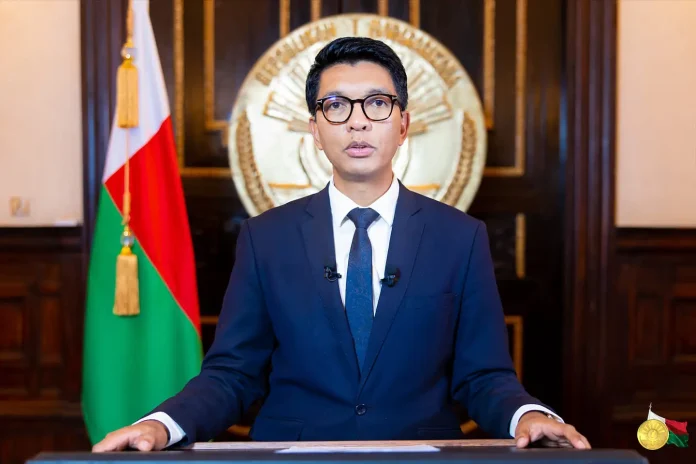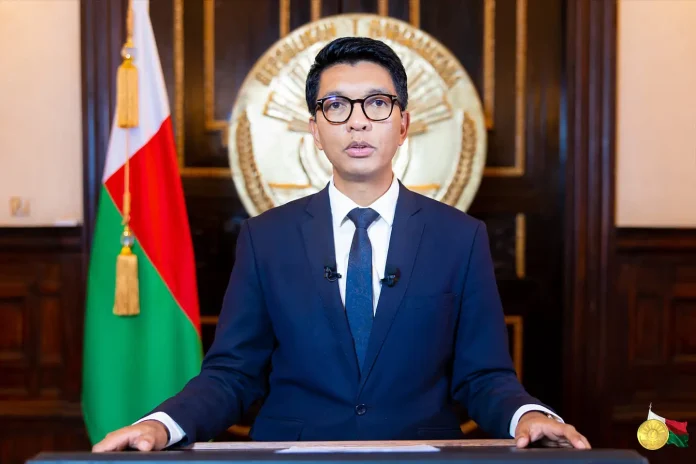
Madagascar’s President Andry Rajoelina has fled the country in fear for his life following a military rebellion, but did not announce his resignation in a speech broadcast on social media late Monday from an undisclosed location.
An opposition official, a military source and a foreign diplomat told Reuters that Rajoelina had fled the country on Sunday aboard a French military plane, though the president himself did not confirm how he left Madagascar or where he was. French state radio RFI reported on Monday, October 13, that the president, who also has French citizenship, had been flown out of the capital, Antananarivo.
He had been scheduled to address the nation at 7 PM (1600 GMT) on Monday, according to a statement from the presidency on Facebook. However, in his eventual address delivered from an undisclosed location, Rajoelina said that he had been forced to move to a safe place because of threats to his life.
Rajoelina, 51, first became president from 2009 to 2014 before returning to power after winning the 2019 election. He secured a second full term in 2023. He became increasingly isolated after losing the support of a key army unit that joined thousands of youth activists known as Gen Z Madagascar to protest against corruption and poverty. The movement had turned down an invitation to meet him for dialogue and demanded his resignation.
People flooded a square in front of the Antananarivo city hall on Monday, October 13, waving flags and chanting slogans, some hanging off military vehicles as they arrived, according to Agence France-Presse reporters.
Among the demonstrators were soldiers from the elite Capsat unit, which played a major role in the 2009 coup during Rajoelina’s rise to the presidency after mass protests forced his predecessor Marc Ravalomanana out of power. Also present were gendarmerie officers, accused of using heavy handed tactics during the near daily protests over more than two weeks. They admitted in a video statement to faults and excesses in their response.
The United Nations says the demonstrations left at least 22 people dead and dozens injured and criticized Madagascan authorities for a violent response to what were largely peaceful protests in the early days of the movement. However, Rajoelina disputed the toll, saying last week there were 12 confirmed deaths and all of these individuals were looters and vandals.
On Saturday, October 11, some Capsat soldiers posted a video to social media saying they would join forces with military, gendarmes and police, and refuse to be paid to shoot their friends, brothers and sisters. They urged fellow security forces to close the gates and await instructions, and not to obey orders from superiors. “Point your weapons at those who order you to fire on your comrades in arms because they will not take care of our families if we die,” they said.
The conflict began following the arrest of two politicians on September 19 after planning a protest against the country’s chronic power and water outages. The protests, which started on September 25, have since escalated into broader demonstrations against Rajoelina’s government over allegations of corruption and failure to deliver basic services.
In a day of turmoil on Monday, Rajoelina sought to dissolve the lower house by decree. But lawmakers went ahead with a vote to impeach him, leaving the country in a constitutional deadlock that the military seized upon to declare they were taking charge.
Colonel Michael Randrianirina, commander of the Capsat military unit, announced that the armed forces were taking control of the country. The military’s announcement came as Madagascar plunged into political uncertainty with competing claims to authority.
The situation remains fluid as international observers monitor developments closely. The protests, inspired by similar Gen Z movements in Kenya and Nepal earlier this year, have represented the most significant unrest in Madagascar in years.
The Indian Ocean island nation of approximately 30 million people has struggled with chronic electricity and water shortages, high inflation, and allegations of government corruption, fueling discontent particularly among young people who make up the majority of the population.
